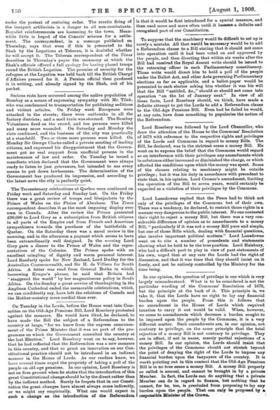On Tuesday in the Lords, before the House went into
Com- mittee on the Old-Age Pensions Bill, Lord Rosebery protested against the measure. He would have liked, be declared, to have made the Bill the subject of a Referendum to the country at large, " for we know from the express announce- ment of the Prime Minister that it was no part of the pro- gramme on which the Government consulted the country at the last Election." Lord Rosebery went on to say, however, that he had reflected that the Referendum was a new measure in this country, and that so great an innovation on our Con- stitutional practice should not be introduced in an indirect manner in the House of Lords. As our readers know, we have several times urged the propriety of taking a poll of the people on old-age pensions. In our opinion, Lord Rosebery is not on firm ground when he states that the introduction of this great Constitutional change should be by the direct rather than by the indirect method. Surely he forgets that in our Consti- tution the great changes have almost always come indirectly, or we might say empirically. What one would expect in such a change as the introduction of the Referendum
is that it would be first introduced for a special measure, and then used more and more often until it became a definite and recognised part of our Constitution.


































 Previous page
Previous page